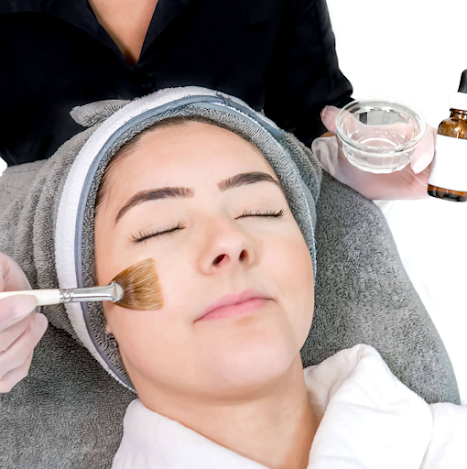Aging is a natural process, but maintaining youthful and radiant skin is achievable with the right skincare routine. One of the most effective treatments for rejuvenating the skin is chemical peels. In this comprehensive guide, we, as skincare experts, will delve into the nuances of Chemical Peels In Dubai , providing you with in-depth knowledge and tips to help you age gracefully.
Understanding Chemical Peels
What Are Chemical Peels?
Chemical peels are dermatological treatments that involve applying a chemical solution to the skin to exfoliate and eventually peel off the top layers. This process reveals fresher, smoother skin underneath and can address a variety of skin concerns, including fine lines, wrinkles, acne scars, and uneven pigmentation.
Types of Chemical Peels
Superficial Peels: Also known as light peels, these use mild acids like alpha-hydroxy acid (AHA) to gently exfoliate the outermost layer of skin. They are ideal for improving minor skin discolorations and rough skin texture.
Medium Peels: These peels penetrate the outer and middle layers of skin, using acids such as glycolic or trichloroacetic acid. They are effective for treating age spots, fine lines, and moderate skin discoloration.
Deep Peels: Utilizing strong acids like phenol, deep peels penetrate the lower dermal layer. They are used for more severe wrinkles, deep scars, and precancerous growths. Due to their intensity, deep peels require a longer recovery period.
Benefits of Chemical Peels
Chemical peels offer numerous benefits, including:
- Improved Skin Texture: By removing dead skin cells, chemical peels reveal smoother and more refined skin.
- Reduced Signs of Aging: Peels can diminish the appearance of fine lines and wrinkles.
- Even Skin Tone: They help to fade hyperpigmentation, sun spots, and acne scars.
- Enhanced Skin Clarity: Pores are minimized, and breakouts are reduced.
- Increased Collagen Production: Chemical peels stimulate collagen synthesis, which is crucial for maintaining firm and elastic skin.
Choosing the Right Chemical Peel for Your Skin
Consultation with a Skincare Professional
Before undergoing a chemical peel, it is essential to consult with a skincare expert. A professional evaluation will help determine the most appropriate type of peel based on your skin type, concerns, and goals.
Patch Testing
Patch testing is crucial to identify any potential allergic reactions or sensitivities. A small amount of the chemical solution is applied to a discreet area of skin to ensure it is safe for use.
Understanding Your Skin Type
- Oily Skin: May benefit from salicylic acid peels, which help to control oil production and clear clogged pores.
- Dry Skin: Lactic acid peels are gentler and help to hydrate the skin while exfoliating.
- Sensitive Skin: Requires milder peels, such as those with lower concentrations of glycolic acid or enzymes.
Preparing for a Chemical Peel
Pre-Peel Skincare Routine
- Cleanse and Moisturize: Keep your skin clean and well-hydrated in the weeks leading up to your peel.
- Avoid Sun Exposure: Protect your skin from UV rays to prevent irritation and hyperpigmentation.
- Discontinue Certain Products: Stop using retinoids, exfoliants, and other potentially irritating products at least a week before your peel.
- Hydrate: Drink plenty of water to ensure your skin is well-hydrated and can heal efficiently post-peel.
Day of the Peel
- No Makeup: Arrive with a clean, makeup-free face.
- Comfortable Clothing: Wear comfortable clothing that does not rub against the face.
Post-Peel Care and Recovery
Immediate Aftercare
- Avoid Touching Your Face: Keep your hands away from your face to prevent irritation and infection.
- Gentle Cleansing: Use a mild cleanser and lukewarm water to clean your face.
- Moisturize: Apply a soothing moisturizer to keep the skin hydrated and aid in healing.
- Sun Protection: Use a broad-spectrum sunscreen with SPF 30 or higher to protect your newly sensitive skin from UV damage.
Long-Term Aftercare
- Hydrate: Continue to drink plenty of water and use hydrating skincare products.
- Avoid Exfoliants: Refrain from using exfoliating products until your skin has fully healed.
- Patience with Peeling: Allow the skin to peel naturally without picking at it.
Common Myths About Chemical Peels
Myth 1: Chemical Peels Are Only for Aging Skin
While chemical peels are excellent for reducing signs of aging, they are also beneficial for younger individuals dealing with acne, hyperpigmentation, and uneven skin texture.
Myth 2: Peels Will Leave Skin Red and Irritated for Weeks
With modern formulations and professional application, most peels cause minimal downtime. Superficial peels, in particular, can leave skin glowing and refreshed within a few days.
Myth 3: All Chemical Peels Are the Same
Chemical peels vary significantly in terms of strength, ingredients, and intended results. A consultation with a skincare expert ensures you receive a peel tailored to your specific needs.
Potential Risks and Side Effects
While chemical peels are generally safe, they can cause side effects, especially if not performed correctly. Possible risks include:
- Redness and Irritation: Mild redness and irritation are common but typically subside within a few days.
- Hyperpigmentation: Post-inflammatory hyperpigmentation can occur, particularly in darker skin tones.
- Scarring: Rare but possible, particularly with deeper peels.
- Infection: Maintaining proper aftercare and hygiene is crucial to prevent infection.
Conclusion!
Skin peel Dubai are a powerful tool in the pursuit of youthful, radiant skin. By understanding the different types of peels, their benefits, and the importance of professional guidance, you can make informed decisions that enhance your skincare routine. Embrace the journey to aging gracefully with the transformative power of chemical peels.




